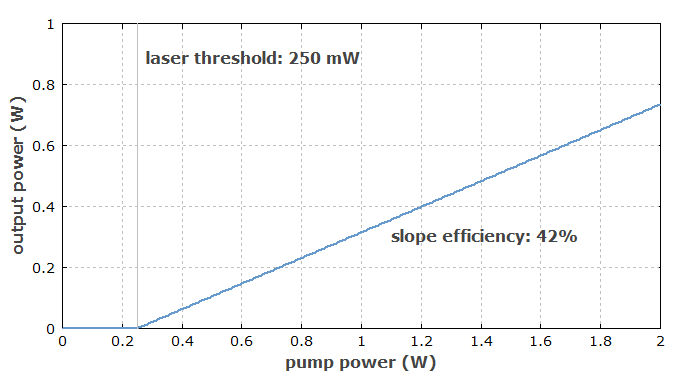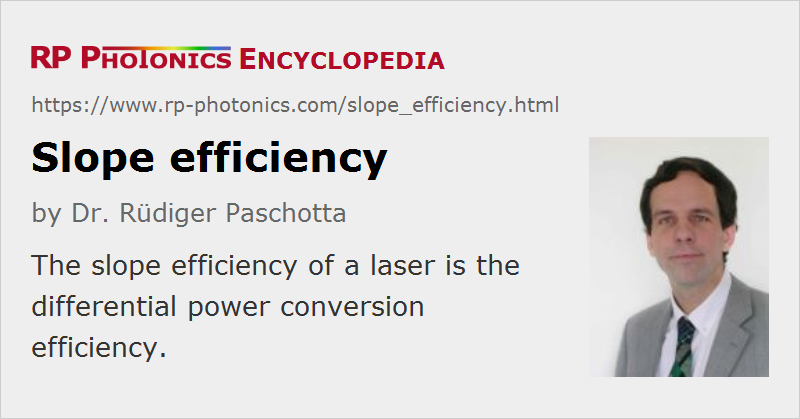Slope Efficiency
Definition: differential power efficiency of a laser
Alternative term: differential efficiency
German: differenzielle Effizienz
Formula symbol: ηsl
Units: %, dimensionless number
How to cite the article; suggest additional literature
Author: Dr. Rüdiger Paschotta
An important property of an optically pumped laser is its slope efficiency (or differential efficiency), defined as the slope of the curve obtained by plotting the laser output versus the pump power (Figure 1). Usually, this curve is close to linear, so that the specification of the slope efficiency as a single number makes sense. The output power of the laser with threshold pump power Pth for a given pump power Pp (above that threshold) can then be simply calculated with the following equation:
However, nonlinear curves can occur under certain circumstances, e.g. as a consequence of quasi-three-level characteristics of the gain medium or thermal effects. For example, there can be a thermal roll-over, if the gain medium becomes hot at high pump powers, and this decreases the power conversion efficiency. A laser may even stop working for too high pump powers, for example when it leaves the stability zone of the laser resonator due to excessive thermal lensing. In case of such nonlinear curves, the slope efficiency is often determined from some approximately linear part.

Note that the slope efficiency may be defined with respect to incident or absorbed pump power. For comparisons of power efficiency, it is usually fair to compare slope efficiencies with respect to incident powers, so that the pump absorption efficiency is taken into account. However, there are cases where values based on absorbed pump power are useful, e.g. for judging the intrinsic efficiency of the gain medium.
In simple situations (e.g., for some diode-pumped YAG lasers), the slope efficiency is essentially determined by the product of the pump absorption efficiency, the ratio of laser to pump photon energy (→ quantum defect), the quantum efficiency of the gain medium, and the output coupling efficiency of the laser resonator. For lamp-pumped lasers, it can be difficult to calculate the slope efficiency due to the difficulties of determining the fraction of pump power which is absorbed in the laser crystal, the position-dependent extraction efficiency and the complicated spectral dependence.
The optimization of the laser output power for a given pump power usually involves a trade-off between high slope efficiency and low threshold pump power. The optimum is usually a situation where the pump power is a few times the threshold pump power, and the slope efficiency is reduced below the value attainable with a stronger degree of output coupling.
The slope efficiency can also be defined for other laser-like devices such as Raman lasers and optical parametric oscillators. In the latter case, the differential slope efficiency with respect to incident pump power can even well exceed 100% under certain circumstances.
Questions and Comments from Users
Here you can submit questions and comments. As far as they get accepted by the author, they will appear above this paragraph together with the author’s answer. The author will decide on acceptance based on certain criteria. Essentially, the issue must be of sufficiently broad interest.
Please do not enter personal data here; we would otherwise delete it soon. (See also our privacy declaration.) If you wish to receive personal feedback or consultancy from the author, please contact him e.g. via e-mail.
By submitting the information, you give your consent to the potential publication of your inputs on our website according to our rules. (If you later retract your consent, we will delete those inputs.) As your inputs are first reviewed by the author, they may be published with some delay.
See also: lasers, laser threshold, threshold pump power, output coupling efficiency, quantum efficiency, The Photonics Spotlight 2006-08-23
and other articles in the category lasers
 |





If you like this page, please share the link with your friends and colleagues, e.g. via social media:
These sharing buttons are implemented in a privacy-friendly way!